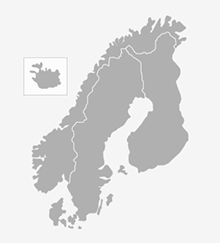VTI is taking a prominent role in two projects in the field of environmentally friendly logistics and sustainable transport: the SATIN* project to increase the circularity of textiles and the SHREK project, which looks at the role of Swedish ports in a circular economy.
Large volumes of textiles are imported to the Nordic region but these are usually only used for a brief time. The majority of used textiles are incinerated and of those that are collected – 22% in Sweden and 46% in Denmark – most are exported.

“Given that the textile industry is one of the world’s most resource-intensive and polluting sectors, it is vital that we find ways to increase the working life of textiles. Doubling the working life would reduce climate impact by 40–50%,” says Linea Kjellsdotter Ivert, a senior researcher at VTI, who believes that identifying Nordic demand for the textiles that are collected is important if we are to achieve increased circularity. Not least given the implementation of a new EU directive concerning the separate collection of textiles.
“Demands for separate collection will involve increased volumes, especially for the fraction of textiles that cannot be reused but hopefully could be recycled.”
This is likely to make it more difficult to dispose of collected textiles, a situation that is exacerbated by the fact that many countries have banned or restricted the import of used textiles.
Among other things, the SATIN project will be developing collection solutions to make it easier for consumers to hand in used textiles. The project will also evaluate different locations for sorting collected textiles and the benefits of joint Nordic sorting facilities.
The SHREK project, a Swedish acronym for ‘the role of Swedish ports in a circular economy’, is intended to develop knowledge about how energy-efficient maritime shipping can to a large extent replace road transport of materials being sent for recycling, primarily with regard to long-distance shipments of materials to recycling plants in other countries.
The project examines materials manufactured in Sweden that can be recycled into other materials and that are transported abroad for recycling by means other than by sea. It also looks at materials that are currently recycled in some other way or discarded, but that could be recycled into materials in future.
“We are investigating where the markets are for waste that is not recycled into materials in Sweden and what opportunities Swedish ports have to play an important role in storing and handling these materials,” says project manager Linea Kjellsdotter Ivert.
Examples of materials that it may be better to ship long distances for recycling rather than being sent for incineration or burial in landfills include glass, plastics, wood, metals, mineral waste and excavated materials.
*SATIN stands for “Towards a sustainable circular system in the Nordic region”.
Text: Johan Granath/redakta
Translated by: Semantix AB

Contact:
Linea Kjellsdotter Ivert
linea.kjellsdotter@vti.se
VTI, National Swedish Road and Transport Research Institute






Follow us: